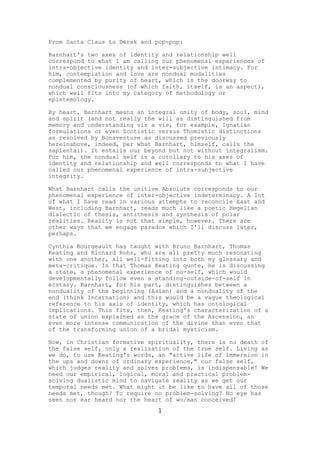
Santa rohr keating
- 1. From Santa Claus to Derek and pop-pop: Barnhart's two axes of identity and relationship well correspond to what I am calling our phenomenal experiences of intra-objective identity and inter-subjective intimacy. For him, contemplation and love are nondual modalities complemented by purity of heart, which is the doorway to nondual consciousness (of which faith, itself, is an aspect), which well fits into my category of methodology or epistemology. By heart, Barnhart means an integral unity of body, soul, mind and spirit (and not really the will as distinguished from memory and understanding vis a vis, for example, Ignatian formulations or even Scotistic versus Thomistic distinctions as resolved by Bonaventure as discussed previously hereinabove, indeed, per what Barnhart, himself, calls the sapiental). It entails our beyond but not without integralism. For him, the nondual self is a corollary to his axes of identity and relationship and well corresponds to what I have called our phenomenal experience of intra-subjective integrity. What Barnhart calls the unitive Absolute corresponds to our phenomenal experience of inter-objective indeterminacy. A lot of what I have read in various attempts to reconcile East and West, including Barnhart, reads much like a poetic Hegelian dialectic of thesis, antithesis and synthesis of polar realities. Reality is not that simple, however. There are other ways that we engage paradox which I'll discuss later, perhaps. Cynthia Bourgeault has taught with Bruno Barnhart, Thomas Keating and Richard Rohr, who are all pretty much resonating with one another, all well-fitting into both my glossary and meta-critique. In that Thomas Keating quote, he is discussing a state, a phenomenal experience of no-self, which would developmentally follow even a standing-outside-of-self in ecstasy. Barnhart, for his part, distinguishes between a nonduality of the beginning (Asian) and a nonduality of the end (think Incarnation) and this would be a vague theological reference to his axis of identity, which has ontological implications. This fits, then, Keating's characterization of a state of union explained as the grace of the Ascension, an even more intense communication of the divine than even that of the transforming union of a bridal mysticism. Now, in Christian formative spirituality, there is no death of the false self, only a realization of the true self. Living as we do, to use Keating's words, an "active life of immersion in the ups and downs of ordinary experience," our false self, which judges reality and solves problems, is indispensable! We need our empirical, logical, moral and practical problemsolving dualistic mind to navigate reality as we get our temporal needs met. What might it be like to have all of those needs met, though? To require no problem-solving? No eye has seen nor ear heard nor the heart of wo/man conceived! 1
- 2. Reportedly, a few have tasted some heavenly delights but, as Fr. Keating says, God is beyond all of our categories. We mustn't confuse, however, a phenomenal state of mind or state of awareness, especially a lack thereof, with an ontological fact of existence. Fr. Keating refers to a phenomenal state or experience of no-self (no reflection of self) and not an ontological status of NO-SELF. Most of what Fr. Rohr teaches involves neither these phenomenal experiences nor their ontological contexts but, instead, methodological or epistemological approaches or stances, specifically, regarding nondual consciousness, all within the context of matters regarding intra-subjective integrity. His accounts of nondual consciousness and contemplation resonate with Barnhart's; among the dozens of contemporary spiritual teachers regarding nonduality, he most highly recommends Thomas Keating, Cynthia Bourgealt and Bruno Barnhart. Regarding St Bernard's spousal love, it IS dual, ontologically, inter-subjectively, which is a teleologically deeper reality than any nondual intra-objective realization. Methodologically, though, the nondual approach augments our inter-subjective value-realizations and the merely dualistic would indeed be impoverished, which is not to at all deny that it can realize real value for, as I said before, in this life, it is both necessary and sufficient to realize abundant value in our relationships with both our Creator and fellow creatures. So, the dualistic does not have a negative valence. In fact, it is an indispensable moment in our human valuerealization movements. BUT --- I have said much of this already? several times now? Confused At any rate, I welcome the opportunity to parse and disambiguate others' works with my glossary and meta-critical categories. Smiler Again, the practical take-away is that nondual and dual can refer to anthropology, phenomenology, ontology, metaphysics (ontology with a capital "O"), axiology, epistemology or theology. And not just from author to author or tradition to tradition but within any given author's discussions! Finally, while I understand and appreciate what appears to me to be a lot of people's preoccupation with experiences and metaphysical speculation, methodological approaches have always had more traction with me. 2
